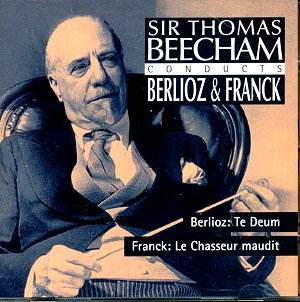Berlioz suggested a choir of eight hundred for
his Te Deum – a work he characterised, albeit with a degree of
understatement – as "colossal, Babylonian". He subsequently
agreed to a reduction to one hundred and fifty thus probably cutting
out most of the 600 choirboys he’d originally envisaged. For this
1953-54 recording Beecham and his forces made further necessary
reductions – but we can nevertheless still hear the vaunting forces
of the London Philharmonic Choir and Dulwich College Boys Choir
in the acoustic of Hornsey Parish Church. Denis Vaughan, a bassist
in the Royal Philharmonic at the time, plays the organ on this
recording and Alexander Young is the splendid tenor. It should
be noted that Beecham omitted the Praeludium and the final March
for the Presentation of the Colours; otherwise everything is grandly
conceived, gloriously and even heroically in place. Vaughan reminisces
in Graham Melville-Mason’s witty and knowledgeable notes that
Beecham walked down the aisle during the recording to listen to
a playback whilst sporting a wreath on his head. It’s the kind
of work – and the kind of performance – to encourage such Caesarean
attitudes.
The Dulwich choir is pitched straight in; they
maintain discipline and shape and sing with characterful tone.
Beecham whips up the passionate conviction, the dramatic diminuendi,
the fissure and passion as we near the outburst of Te aeternum
Patrem. Vaughan tried to cultivate the characteristic French organ
sound in Hornsey – he used four stops in the Tibi omnes, a mixture
and three reeds – and he succeeds to a large degree. The climaxes
here are judged splendidly but what most lingers in the mind is
the orchestral conclusion to the movement where the string gravity,
its weight calibrated to just limits, carries depth of concentration
to the outermost limits. Dignare, Domine sees much antiphonal
writing for choir and organ; the singing here is beautifully refined
and raptly intense. To hear the Tu, Christe burst into measured
life is also to appreciate the excellent balance between the constituent
parts of the performance – no easy matter when, as here, Berlioz
writes for full choir (boys choir and both divisions of the full
choir), organ and orchestra. The climax is truly resplendent in
Beecham’s hands and never grandiloquent or forced but rather a
natural accumulation of musical direction. Young’s ever-attractive
voice, plangent and expressive is heard in the Te ergo quæsumus
and he is matched by the choir’s delicacy behind him. The immutable
tread of the concluding Judex crederis brings with it an intense
uncoiling, the ostinati driving ever onwards, towards the truly
blazing climax of brass, percussion and organ.
Coupled with the Berlioz is Franck’s Le Chasseur
maudit, a bit of a penny dreadful that receives an idiosyncratic
(read; Beechamesque) performance from the bold Bart. This is a
case of a work fashioned to the interpreter’s scenic will. Dynamics
are frequently inverted as Beecham seeks to contour the work to
his eviscerating liking. It’s marvellously done – panache, drive,
virtuosity, wit - but purists will be weeping into their hair
shirts.
There was something in the air in these islands
in the four short years between 1879 and 1882. Forth came Beecham,
Stokowski, Russian-born Coates and Harty; someone needs seriously
to consider a systematic reissue programme for Harty, Cala is
doing Stokowski proud and Sony keeps on with its elegant and impressive
Beecham traversal. Long may it continue.
Jonathan Woolf
